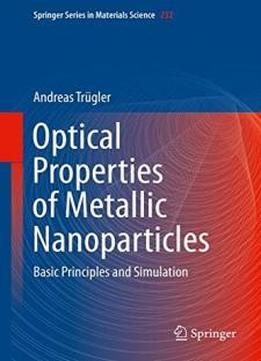
Optical Properties Of Metallic Nanoparticles: Basic Principles And Simulation (springer Series In Materials Science)
by Andreas Trügler /
2016 / English / PDF
8.2 MB Download
This book introduces the fascinating world of plasmonics and
physics at the nanoscale, with a focus on simulations and the
theoretical aspects of optics and nanotechnology. A research
field with numerous applications, plasmonics bridges the gap
between the micrometer length scale of light and the secrets of
the nanoworld. This is achieved by binding light to charge
density oscillations of metallic nanostructures, so-called
surface plasmons, which allow electromagnetic radiation to be
focussed down to spots as small as a few nanometers. The book is
a snapshot of recent and ongoing research and at the same time
outlines our present understanding of the optical properties of
metallic nanoparticles, ranging from the tunability of plasmonic
resonances to the ultrafast dynamics of light-matter interaction.
Beginning with a gentle introduction that highlights the basics
of plasmonic interactions and plasmon imaging, the author then
presents a suitable theoretical framework for the description of
metallic nanostructures. This model based on this framework is
first solved analytically for simple systems, and subsequently
through numerical simulations for more general cases where, for
example, surface roughness, nonlinear and nonlocal effects or
metamaterials are investigated.
This book introduces the fascinating world of plasmonics and
physics at the nanoscale, with a focus on simulations and the
theoretical aspects of optics and nanotechnology. A research
field with numerous applications, plasmonics bridges the gap
between the micrometer length scale of light and the secrets of
the nanoworld. This is achieved by binding light to charge
density oscillations of metallic nanostructures, so-called
surface plasmons, which allow electromagnetic radiation to be
focussed down to spots as small as a few nanometers. The book is
a snapshot of recent and ongoing research and at the same time
outlines our present understanding of the optical properties of
metallic nanoparticles, ranging from the tunability of plasmonic
resonances to the ultrafast dynamics of light-matter interaction.
Beginning with a gentle introduction that highlights the basics
of plasmonic interactions and plasmon imaging, the author then
presents a suitable theoretical framework for the description of
metallic nanostructures. This model based on this framework is
first solved analytically for simple systems, and subsequently
through numerical simulations for more general cases where, for
example, surface roughness, nonlinear and nonlocal effects or
metamaterials are investigated.











